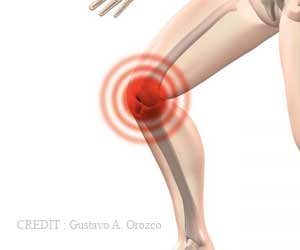52 new genetic changes linked to osteoarthritis, which doubles the number of genetic regions associated with the disabling condition.

‘New genes and biological pathways linked to osteoarthritis, which could help identify starting points for new medicines. ’





Scientists at the Wellcome Sanger Institute, GSK and their collaborators analysed the genomes of over 77,000 people with osteoarthritis. Their findings, published today in Nature Genetics, highlighted opportunities for existing medicines to be evaluated in osteoarthritis. There is no disease-modifying treatment for osteoarthritis. The disease is managed with pain relief medications and often culminates in joint replacement surgery, which has variable outcomes. Osteoarthritis is the most prevalent musculoskeletal disease and a leading cause of disability worldwide. In the UK, the disease indirectly costs the economy £14.8 billion each year*.
To uncover the genetics underpinning osteoarthritis, scientists from the Sanger Institute, GSK and their collaborators analysed the whole genomes of over 77,000 people with osteoarthritis and over 370,000 healthy people using patient data from the UK Biobank resource and the arcOGEN study**. The team studied many different types of osteoarthritis, including in knee and hip joints.
Professor Eleftheria Zeggini, previously from the Wellcome Sanger Institute and now based at Helmholtz Zentrum München in Germany, said: "Osteoarthritis is a very common, disabling disease with no cure. We have conducted the largest study of osteoarthritis to date, and found over 50 new genetic changes that increase the risk of developing osteoarthritis. This is a major step forward in developing treatments to help the millions of people suffering from the disease."
In order to discover which genes cause osteoarthritis, the team incorporated additional functional genomic data and analysed gene activity by measuring gene expression down to the protein level. The team integrated genetic and proteomic data on tissue taken from patients undergoing joint replacement surgery. By incorporating many different data sets, scientists were able to identify which genes were likely to be causal for osteoarthritis.
Advertisement
Dr Stephen Simpson, Director of Research at Versus Arthritis, who supported the arcOGEN study, said: "Osteoarthritis affects over 8.5 million people across the UK. We know that the condition impacts people in different ways, meaning the treatment that works for one person doesn't always work for someone else.
Advertisement
Source-Eurekalert















